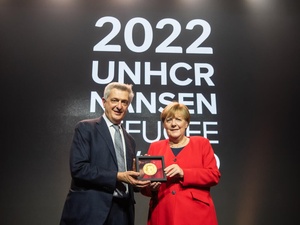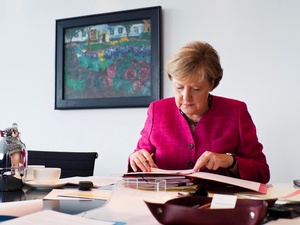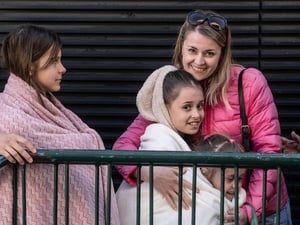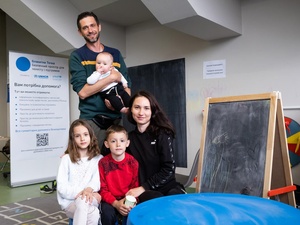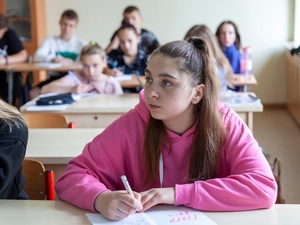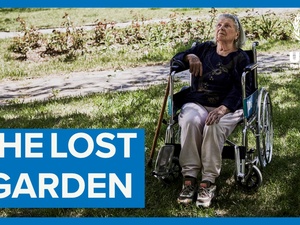Two children drown every day on average trying to reach safety in Europe
Two children drown every day on average trying to reach safety in Europe

Greek volunteer life-guards help a young child out of a boat that reached the shores of Lesbos, having crossed the Aegean sea from Turkey.
KOS, Greece, Feb 19 (UNHCR) - Two children have drowned every day on average since September 2015 trying to cross the eastern Mediterranean to find safety with their families in Europe, UNHCR, the UN Refugee Agency, said today.
In a joint statement, issued in Geneva, UNHCR, UNICEF and the IOM warned that the number of child deaths was on the increase and called for more measures to increase safety for those escaping conflict and despair.
Since last September, when the tragic death of toddler Aylan Kurdi captured the world's attention, more than 340 children, many of them babies and toddlers, have drowned in the eastern Mediterranean. The total number of children who have died may be even greater, the sister organisations said, with their bodies lost at sea and never recovered.
One of those statistics was seven-year-old Houda from Afghanistan who went missing in a shipwreck off the Greek island of Kos at the end of January. Her mother, father, two sisters and one of her brothers had left Kabul for Istanbul earlier that month after her father, a middle-ranking police officer, received death threats.
In Turkey, the family made a deal with a smuggler who promised them an "extra-safe trip in a spacious large boat" to Greece. To pay for the trip, Houda's father had sold his house and borrowed money from family and friends.
At night in a dark bay as they prepared to leave, they saw the boat was little more than a sailing coffin. It was small, old and massively overcrowded with around 80 passengers covering a few metres of deck.
They tried to step back, but were forced by the smuggler to board the boat with no questions. Smugglers allow no last-minute change of mind.
Houda's sister Aisha and her brother Aziz survived that deadly trip, along with 26 others, but her mother, father and an older sister perished. Their bodies were recovered. Houda's was never found. Aisha and Aziz, 16 and 15 respectively, had learned to swim in school and that saved them.
The stretch of the Aegean Sea between Turkey and Greece is now among the deadliest routes in the world for refugees and migrants.
"These tragic deaths in the Mediterranean are unbearable and must stop," said UN High Commissioner for Refugees Filippo Grandi. "Clearly, more efforts are needed to combat smuggling and trafficking. Also, as many of the children and adults who have died were trying to join relatives in Europe, organising ways for people to travel legally and safely, through resettlement and family reunion programmes for example, should be an absolute priority if we want to reduce the death toll," he added.
With children now accounting for 36 per cent of those on the move, the chance of them drowning on the Aegean Sea crossing from Turkey to Greece has grown proportionately. During the first six weeks of 2016, 410 people drowned out of the 80,000 people crossing the eastern Mediterranean. This amounts to a 35-fold increase year-on-year from 2015.
Aisha and Aziz are now accommodated at a transit facility UNHCR runs with a national NGO offering specialized services to unaccompanied refugee children in Greece until they are assigned to a permanent facility. They wish to reunite as soon as possible with what remains of their family. They have a brother in Germany and hope one day to be able to join him there.
"These children expressed incredible dignity and courage throughout the many challenges they faced after the shipwreck. After already identifying the corpses of his own family members at the Coast Guard, Aziz insisted on seeing more pictures in order to recognize fellow travellers and help in their identification so that their families could also find out what had happened to them. They repeatedly expressed their gratitude towards me and other colleagues for the help we provided," said Georgios Papadimitriou, a senior protection officer with UNHCR.
Marco Procaccini, UNHCR's Head of Office in Kos, said: "I was impressed by the resilience and the courage of Aziz and Aisha since we met them at the port where they were brought by the Coast Guard vessel which rescued them that terrible night. Despite going through the worst we can ever image for a child, they remained always polite and kind."
Aziz thanked UNHCR, other NGOs and the local volunteers that supported him and his sister during this difficult time and said one day he would return with the rest of what remains of the family to visit the graves of those who were found and also say a prayer for Houda.
Full press release here
By Marco Procaccini in Kos, Greece


